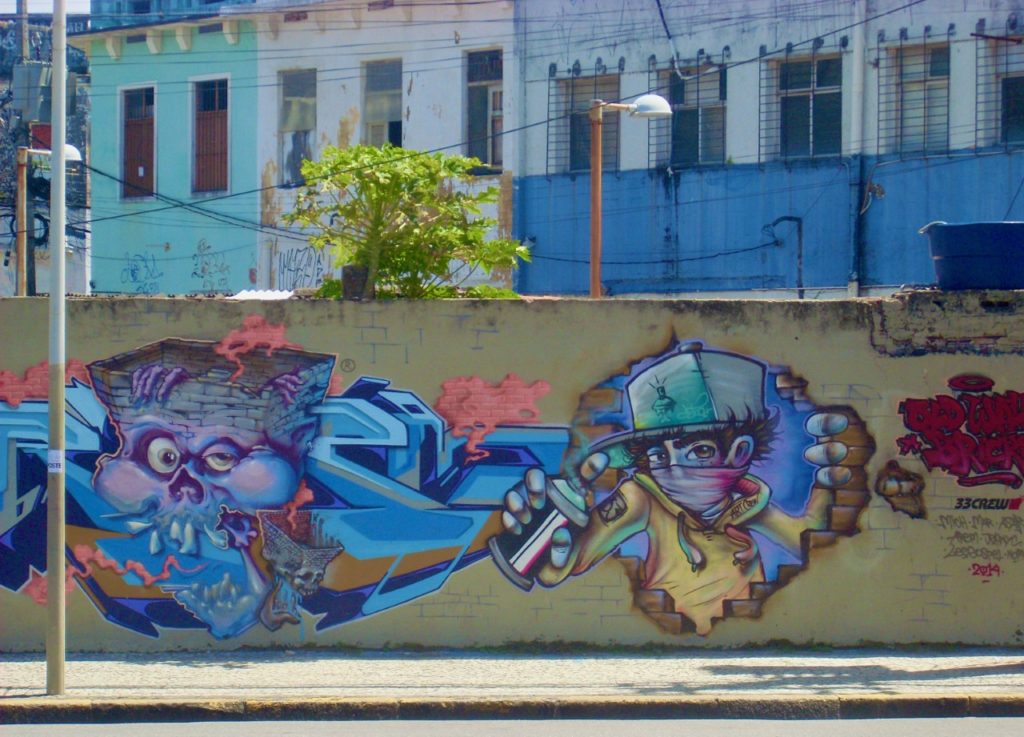On May 31, 2020, the US exploded in protest to address the super-exploitation of racism, which has uniquely scarred its history. This was followed by international demonstrations, including massive demonstrations in Paris against police brutality, a common theme of the Gilets Jaunes, a protest starting in November 2018 that I was studying. However, this time the Paris protests included the Gilets Jaunes but focused specifically on the brutality against youth and people of color. In these important new developments, we have seen an international mobilization which may now be breaking down, or breaking through, some of the fragmentations of the working class between so-called but no longer stable working classes, the imagined middle classes also at risk of instability, and the super-exploited subjects divided by racism, sexism, colonialism, citizenship and other forms of historical subordinations.
Here I consider long-term research among street protests in France in relation to the post-Covid outrage against police brutality. Austerity policies should be seen not simply as a consequence of the Great Recession in the wake of the financial crisis but rather as the latest most destructive stage of a neoliberal assault that began worldwide in the 1970s. My ongoing research in France suggests that the mass demonstrations which began with the French Occupy movement Nuit Debout (see Susser 2016, 2017) in 2016 and continued through a variety of strikes among students, transportation workers and others until the Gilets Jaunes demonstrations of fall 2018, and finally the massive pension demonstrations of 2019/2020, represent an effort to rebalance the pendulum in the struggles against the ever more virulent neoliberal assault. These are, in the end, international processes. I suggest that the kinds of demonstrations which were emerging powerfully in France before Covid-19, are now beginning to take place in the US and elsewhere. The disastrous inequalities that were massively exposed in the unequal fatalities and economic distress caused by the pandemic (see Focaalblog: Kalb 2020, Nonini 2020) have precipitated protests that can be seen as part of an ongoing formative process.
Long-term neoliberal assault, international dimensions
Long-term neoliberal assault has precipitated the widespread destruction of a particular kind of state (Smith 2011) as well as the restructuring of global power and networks (Nonini and Susser 2020). The industrial state underwrote the corporate world by subsidizing the education, health and stability of a large proportion of workers. Twentieth century workers’ struggles established the particular forms of social reproduction originally reified in the welfare state. The idea, for example, of ‘a fair day’s wage’ encompassed the costs of the patriarchal, heterosexual family for the reproduction of men with their wives and children. However, the stable working class emerged alongside and in interaction with lower and precarious standards of reproduction for minorities, migrants and other historically subordinate groups and women, as well as the uneven development of (post) colonialism. In other words, industrial capitalism included a super-exploited working class, marked by race and gender, citizenship rights and in many cases, indigeneity (Carrier and Kalb 2015; Kasmir and Carbonella 2014; Fraser and Jaeggi 2019, Steur 2015). These groups were the subjects of distinctive historically-defined processes of inequality and they were generally excluded, especially in the United States, from the benefits of the welfare state and the class compromise.
The massive assaults of neoliberalism of the past 50 years destroyed the lives of displaced industrial workers and further devastated minority, immigrant and native communities. Under Covid-19, both in France and more drastically the US, these losses, long manifested in differential mortality rates, among others, have become immediate life and death issues.
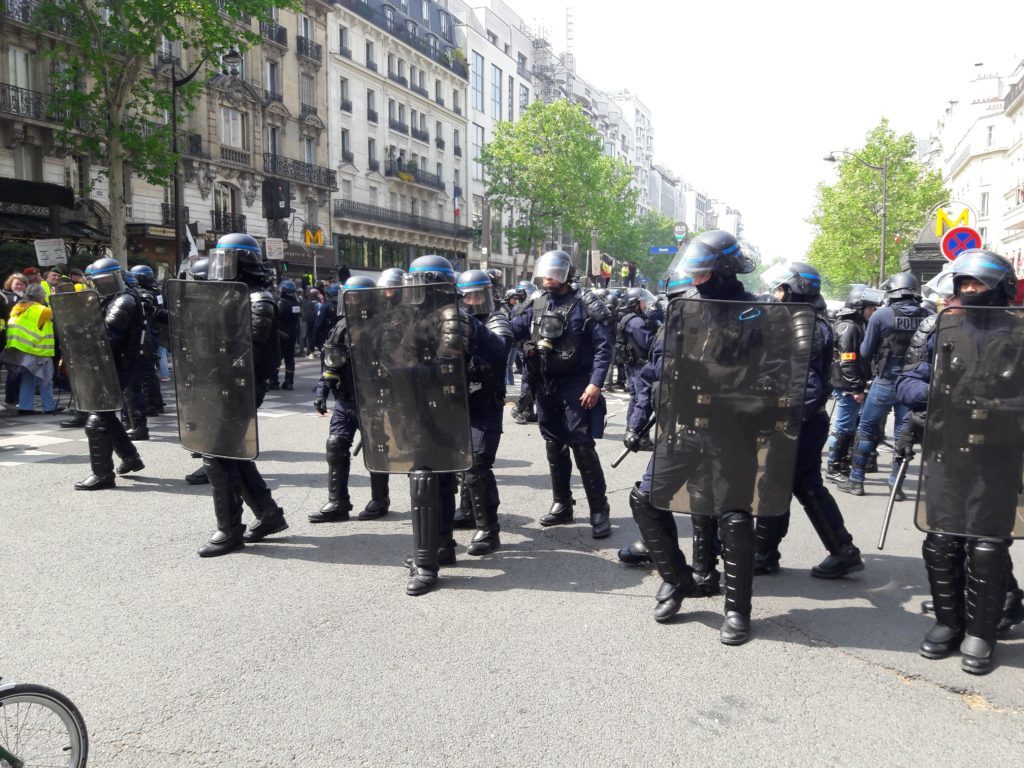
A new working poor of displaced industrial workers compounding the super-exploitation of historically subordinated groups has been recognized in the United States and Europe since the 1990s (Susser 1996). In the shifting global power configurations, contemporary nation-states no longer protect the stability of the traditional working class. The emergence of different forms of social movements can be seen as an attempt to redress the assault on customary living conditions, life cycle security and aspirations. I would suggest that this is also an attempt to redefine workers to include the previously neglected minorities as well as new family and identity configurations. New forms of worker protection will have to consider new forms of relationships within families and new kinds of work/leisure routines to address issues that some categorize as identity politics (such as feminism and LBGT rights).
From Nuit Debout to Gilets Jaunes
After Nuit Debout, 2016-17 in France, which was largely a big city, youth led, leftist Occupy movement, the next major mobilization was that of the Gilets Jaunes (2018-2019). The Gilets Jaunes were recognized as a new phenomenon as they came from the urban peripheries of Paris and throughout the provinces. Not regarded as cosmopolitan they included many teachers, nurses, social workers as well as truck drivers, chefs, construction workers and service workers in general. Many Gilets Jaunes were middle aged and some were thought to be right wing.
Although perhaps not representative, it should be noted that the woman who sent out the first call to protest the new fuel tax implemented by President Emmanuel Macron was an educator of color from the urban periphery of Paris. In addition, contrary to stereotype and the government portrayal of the demonstrations, Gilets Jaunes insisted that they did not object to environmental concerns. They objected to a measure that targeted for extra tax the fuel that poor people in the urban peripheries were dependent on for their daily commutes. Protests were organized in collaboration with climate activists to demonstrate their common concerns and the support of the Gilets Jaunes for the environment. A frequent chant and sign stated; we care about “the end of the month and the end of the world”.
The first email call to protest the fuel tax was put out in September 2018 but by November, when the Gilets Jaunes began to block the highways and roundabouts and gather in thousands in the streets of Paris, they were objecting to much more than the fuel tax. They were concerned with the degradations of public services, the privatization of health care and their own daily challenges as well as what they saw as the decay of democracy. These protestersfrom the urban periphery frequently described the lack of investment in public transportation outside Paris and the declining support for provincial services as illustrating the “stealing of the state.” (Susser 2020). People regarded public services as a right and saw the services as belonging to the state as paid for by their tax money and therefore belonging to them. When the state privatized a service, it was seen as ‘stealing the public money.’ The destruction of the state is manifest not only in the privatization and dismantlement of public services, but also in the crisis of daily life, the family, education, health care, the aged, the handicapped (highly visible at protests on crutches and in wheelchairs) and the students, who feel they are “losing their futures,” as one protester said to me.
Continued Gilets Jaunes resistance
Until the pension strike, which began in September 2019, the Gilets Jaunes were the most powerful, and most supported of a variety of movements that had emerged in France since the austerity policies imposed in the wake of the financial crisis. They linked many of the uprisings and strikes from different sectors (such as railroads, teachers and health workers) and the smaller uprisings among hospital aides or the sans-papiers as well as the climate change activists and left-wing organizations. Not concentrated in the workplace although participating in many disparate strikes, the Gilets Jaunes invented new methods, such as the occupation of the ronds-points, the building of cabanas and the freeing of toll booths. In these ways, the Gilets Jaunes were attempting to forge a new set of resistances and generating the support of the public from the banlieues to the provinces. The movement was both enraged and resilient: Enraged at the loss of community and public and social services over time, and resilient in the commoning efforts to create a new community (Susser 2020). The Gilets Jaunes, made up of working-class people on the urban periphery, including many pensioners and families who could not make ends meet, were crafting an emerging oppositional bloc.
The pension protests began in September 2019, when strikers closed down the metro and the buses for a day. A few months later, different sectors from health care workers, legal professions, social services, educators and others, organized massive strikes and demonstrations in the streets that continued until they were shut down by the Covid 19 epidemic in March 2020.
Gilets Jaunes among the grassroots union members, in many ways, had forced the unions to take up more militant positions against the pension changes. As health workers, lawyers and transportation workers marched in massive protests through Paris, Gilets Jaunes could be seen populating the street protests of every profession in their distinctive yellow jackets, personal statements written in black marker on their backs. The signature song of all the pension protests was that of the Gilets Jaunes, as were many of the chants and banners. Until Paris was closed down for Covid-19 in March 2020, the Gilets Jaunes and the massive pension marches combined in different, often conflicted, ways across France, in some cities with more cooperation in time and place than others.
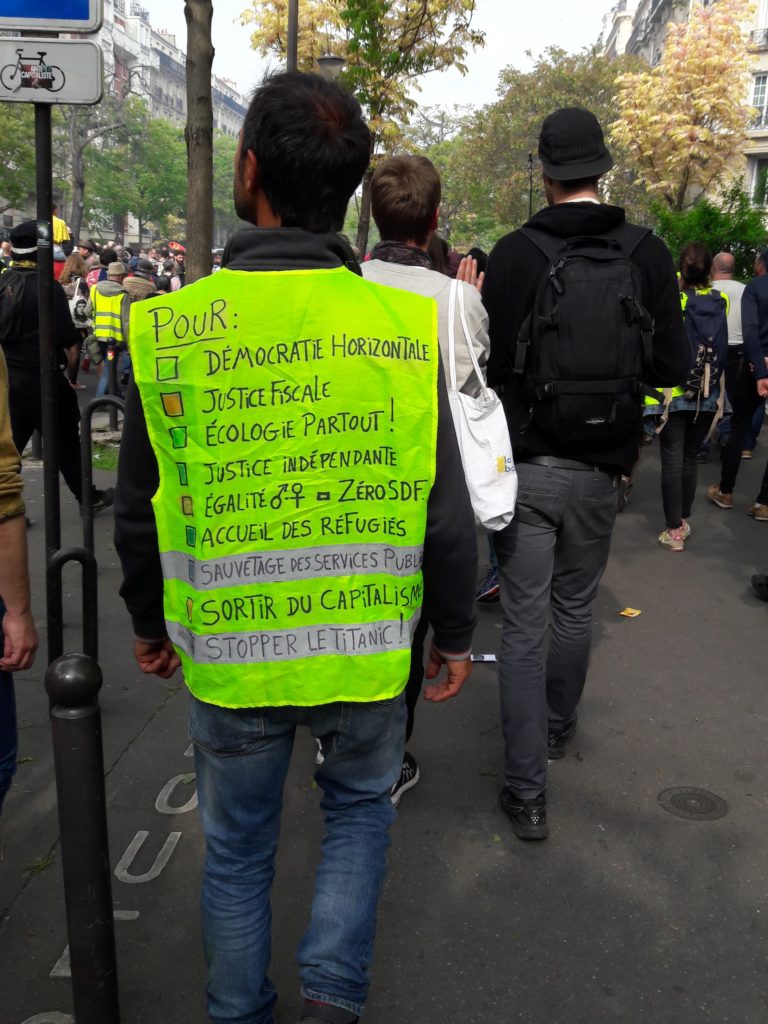
In France, Nuit Debout, the Gilets Jaunes, the pension strikers and many other movements represent transformative spaces where people in the current era of financialization and globalization are struggling to work out new strategies. Activists envision horizontalist movements as an effort to develop innovative forms of protest to counteract the increasing inequality, authoritarian tendencies and hardened boundaries of the new global regime. Such progressive representation strives for inclusivity and the breakdown and recognition of established hierarchies of gender, race, immigration and class, among others. Each of these groups has to be understood in the context of their own history and social movements. The participants in Nuit Debout were not the same as the Gilets Jaunes. However, in France and elsewhere, multiple subaltern groups may be beginning to recognize themselves as part of a larger political bloc in opposition to the destruction of the welfare state and degradation of democratic representation (Kalb and Mollona 2018). Such movements are contingent and contested, reflective of the same rage against the destruction of living standards and aspirations for a generation but offering hope for more inclusive solutions.
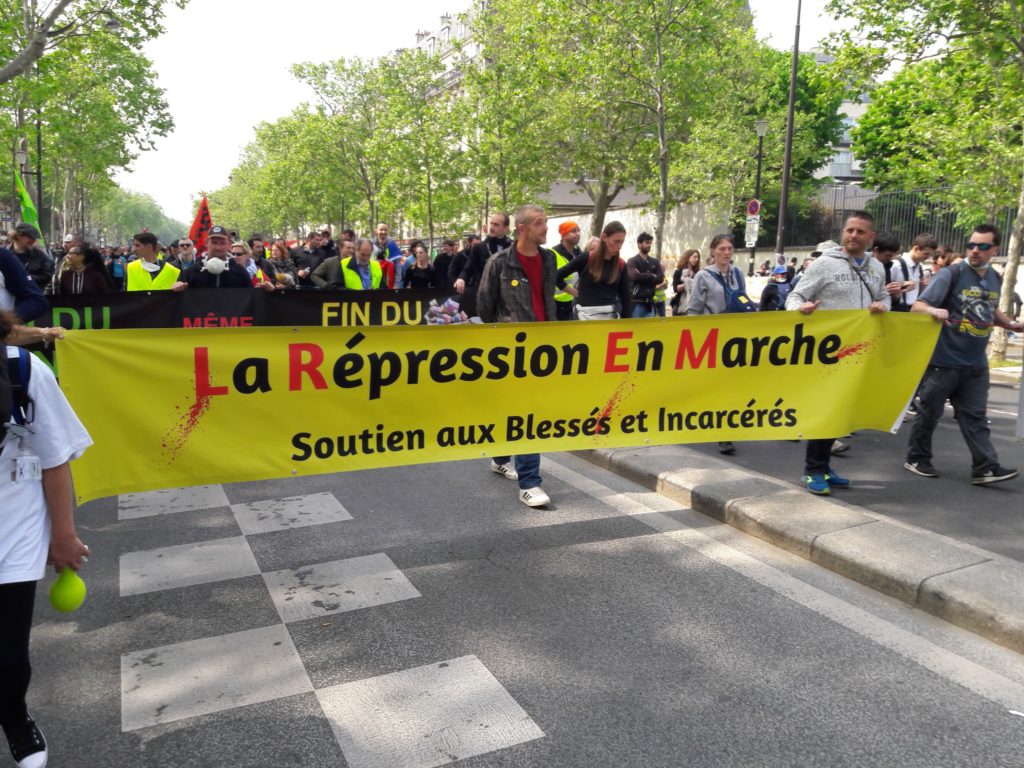
Before the Gilets Jaunes, in 2016/7 activists from Nuit Debout had protested the police violence often focused on young men of color in the streets. The Gilets Jaunes protested the violence of the police against their own street demonstrations for over a year. It is a crucial development that in June 2020 the Gilets Jaunes joined ranks with the protests against police brutality and racism that were rocking the world. At this conjuncture, after the shocking Covid-19 shutdown and the disproportionate deaths of people of color in France as elsewhere, the displaced workers of the urban periphery joined directly with the superexploited immigrants, refugees and previously colonized people of color from the banlieues in several unprecedented massive demonstrations.
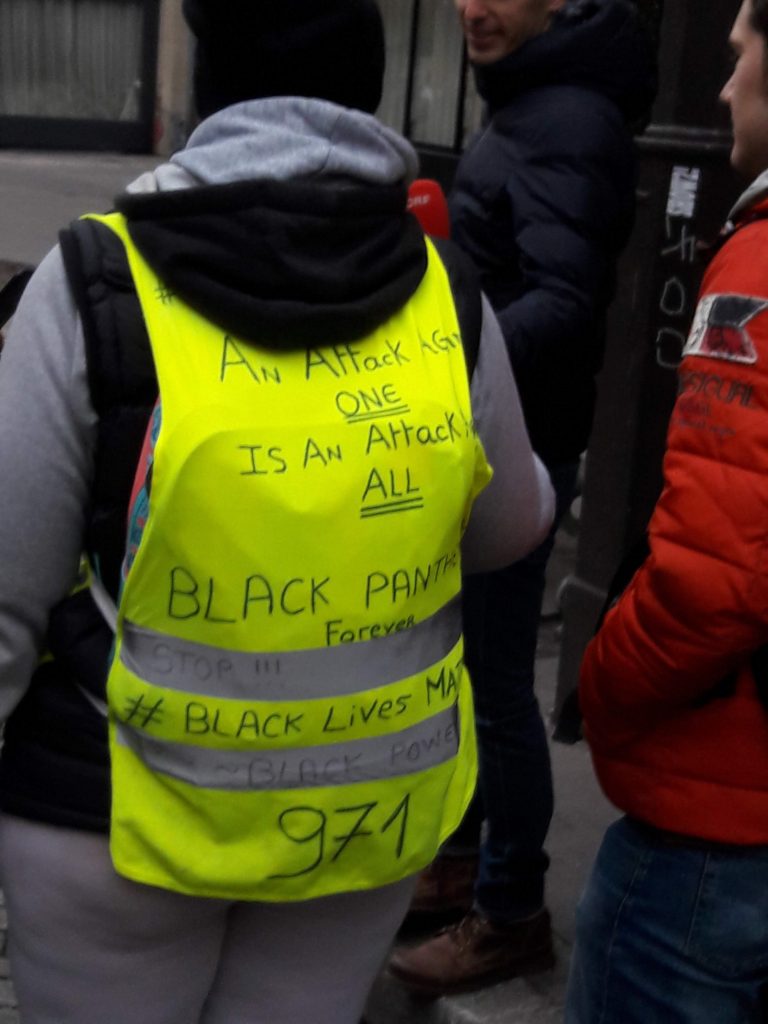
As Polanyi knew, rage against the disastrous failures of (neo)liberalism could be expressed in brutal and fascist ways (see also Maskovsky and Bjork-James 2020, Kalb and Halmai 2011). However, the protests that we see today are a hopeful sign in their inclusive progressive moments bringing together many groups who are all at risk in different ways and at different levels or aspects of exploitation. They are demanding a rebalancing of the destructive neoliberal assault of the past 50 years. They are constructing an inclusive but uneven critical community which may serve as an antidote against the growing fury which is fueling nationalism and exclusivism (see also Kalb and Mollona 2018).
Ida Susser is Distinguished Professor of Anthropology at Hunter College and the Graduate Center, City University of New York. Her most recent book is The Tumultuous Politics of Scale, co-edited with Don Nonini.
References
Fraser, Nancy and Rahel Jaeggi. 2018. Capitalism: A Conversation in Critical Theory. Medford, MA: Polity
Carrier, James and Don Kalb (eds.) 2015. Anthropologies of Class: Power, Practice and Inequality. Cambridge: Cambridge University Press.
Kalb, Don and G Halmai (eds.) 2011. Headlines of Nation, Subtexts of Class: Working Class Populism and the Return of the Repressed in Neoliberal Europe. Vol. 15. Oxford: Berghahn Books.
Kalb, Don and Massimilliano Mollona (eds.) 2018. Worldwide Mobilizations. New York: Berghahn Books.
Kasmir, Sharryn and August Carbonella (eds.) 2014. Blood and Fire. New York: Berghahn Books
Kalb, Don 2020. Covid, Crisis and the Coming Contestations. http://www.focaalblog.com/2020/06/01/don-kalb-covid-crisis-and-the-coming-contestations/
Maskovsky, Jeff and S. Bjork-James (eds.) 2020. Beyond Populism: Angry Politics and the Twilight of Neoliberalism. Morgantown, WV: West Virginia University Press
Nonini, Don 2020 Black Enslavement and the Coming Agro-Industrial Capital. http://www.focaalblog.com/2020/07/03/don-nonini-black-enslavement-and-agro-industrial-capital/
Nonini, D. and I. Susser (2020). The Tumultuous Politics of Scale. New York: Routledge.
Smith, Gavin (2011). Selective Hegemonies, Identities, 18(1): 2-38.
Steur, Luisa (2015). Class trajectories and indigenism among agricultural workers in Kerala. In: Carrier J and Kalb D (eds) Anthropologies of Class: Power, Practice and Inequality. Cambridge: CUP, pp.118-130.
Poperl, Kevin and Ida Susser (1996). “The Construction of Poverty and Homelessness in US Cities.”Annual Review of Anthropology 25 (1): 411–35.
Susser, Ida (2018) Inventing a Technological Commons: Confronting the Engine of Macron, http://www.focaalblog.com/2018/04/19/kevin-poperl-and-ida-susser-inventing-a-technological-commons-confronting-the-engine-of-macron/
Susser, Ida (2017). Introduction: For or Against the Commons?, Focaal 79:1-5.
Susser, Ida (2017). Commoning in New York City, Barcelona and Paris: Notes and observations from the field. Focaal 79: 6-22.
Susser, Ida (2020, forthcoming). “They are stealing the state”: Commoning and the Gilets Jaunes in France. In: Urban Ethics Moritz Ege and Johannes Moser (eds.). New York: Routledge.
Cite as: Susser, Ida. 2020. “Covid, police brutality and race: are ongoing French mobilizations breaking through the class boundaries?” FocaalBlog, 3 December. http://www.focaalblog.com/2020/12/03/ida-susser:-covid,-police-brutality-and-race:-are-ongoing-french-mobilizations-breaking-through-the-class-boundaries?/
